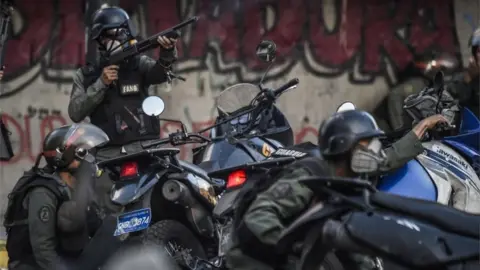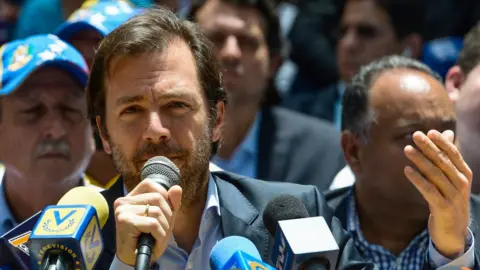UN warns Venezuela over 'use of excessive force'
 AFP
AFPThe United Nations Human Rights Office has warned of "widespread and systematic use of excessive force" being used against protesters in Venezuela.
It also speaks of other human rights violations, including "violent house raids, torture and ill-treatment".
It says that the security forces are allegedly responsible for at least 46 deaths which occurred in protest-related violence.
The findings are based on interviews.
'Deadly force'
A statement released on Tuesday says that "in the absence of responses from the Venezuelan authorities to requests for access, UN High Commissioner for Human Rights Zeid Ra'ad Al Hussein deployed a team of human rights officers to conduct remote monitoring of the human rights situation in the country ".

Read more:

The UN human rights team conducted interviews remotely because its requests for access went unanswered by the Venezuelan authorities.
Witnesses told the UN that the Venezuelan security forces had fired tear gas and buckshot without warning.
"Security forces have reportedly also resorted to the use of deadly force against demonstrators," the statement reads.
'Ill-treatment and torture'
"Since the wave of demonstrations began in April, there has been a clear pattern of excessive force used against protesters. Several thousand people have been arbitrarily detained, many reportedly subjected to ill-treatment and even torture, while several hundred have been brought before military rather than civilian courts," Mr Hussein said.
He pointed out that "some groups of demonstrators have also resorted to violence, with attacks reported against security officers".
The UN human rights team said that estimates suggested that more than 5,000 people had been arbitrarily detained between 1 April, when the protests began, and 31 July.
The high commissioner urged the Venezuelan authorities "to immediately end the excessive use of force against demonstrators, to halt arbitrary detentions and to release all those arbitrarily detained".
Shortly after the report was issued, Venezuela's Supreme Court ordered the arrest of opposition mayor Ramón Muchacho.
The court had sentenced him to 15 months in prison and barred him from office in the early hours of Tuesday.
Chacao mayor faces arrest
The court said Ramón Muchacho had failed to prevent barricades from being erected during anti-government protests held in Chacao, the opposition stronghold he governs.
 Getty Images
Getty ImagesAfter a nine-hour debate, the Supreme Court found Mr Muchacho, 44, guilty of failing to enforce a court order on preventing the blocking of roads.
Chacao has been one of the neighbourhoods in the capital, Caracas, at the centre of anti-government protests that have swept through Venezuela in the past four months.
It is a gathering point for demonstrations and its roads are often blocked by "trancones", blockades organised by the opposition to show their rejection of the government.
On 24 May, after eight weeks of anti-government protests, the Supreme Court ordered Mr Muchacho and seven other mayors to prevent barricades being erected, and where roads had been blocked, to remove the obstacles.
The court warned that if the mayors did not follow the order, they could face between six and 15 months in jail.
Apart from Mr Muchacho, three other opposition mayors have also been found guilty for failing to prevent barricades from being erected.
